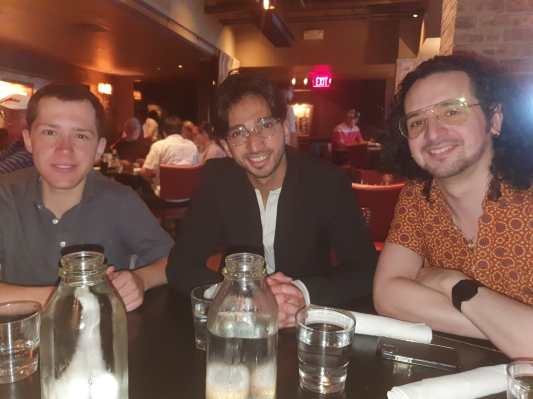There’s no shortage of headlines about the onset of “crypto winter.” Amid a growing pile of bankruptcies, one of the buzziest startups in the business, the NFT marketplace OpenSea, announced a major layoff just today.
Behind the scenes, however, plenty of founders and VCs are doubling down on the promise of largely decentralized, blockchain-based outfits, and toward that end, one of the “more interesting parts of crypto right now” is at the “intersection of social messaging and web3,” says renowned entrepreneur and investor Elad Gil. In short, he thinks today’s messaging tools don’t cut it, and that there will be new opportunities for crypto-native startups to get it right.
Gil has already made an early bet, leading a $4 million seed round in Lines, a startup whose three co-founders studied philosophy at Harvard and whose CEO, Sahil Handa, boasts that the nascent company will become “web3’s messaging platform,” even while he and his former classmates are still developing its tech.
That it’s still a work in progress is apparently just fine with Lines’s backers, which also include renowned angel investors Naval Ravikant, Balaji Srinivasan, Gokul Rajaram. What they’re backing is a vision. There’s a “rapidly increasing number of people using crypto pseudonyms to purchase digital currency, swap NFTs, vote on proposals, and manage treasuries,” explains Handa. “But whenever someone tries to communicate with another person in this network, there’s no way of knowing whether or not they are talking to the right person.”
Lines meanwhile strives to enable users to send messages from wallet to wallet and to join group chats based on token ownership. Indeed, Handa paints a picture of a communication layer that’s both ambivalent about underlying blockchains and the particular crypto wallet a person is using, and that, as a result, empowers users in a wide variety of ways. They can find the owner of a particular NFT they’d like to buy, for example, or discover like-minded individuals based on the tokens they’ve acquired, or reach out to potential new contributors of a DAO (a kind of “group chat with a bank account,” as DAOs have been called).
Certainly, Gil thinks the timing is right as more people organize and transact as a group online. In earlier days, he notes, “Your bitcoin or crypto asset and mine were identical, so I would have less reason to ping an anonymous user via their wallet. But with DAOs, there is the need to coordinate with various members beyond just using Discord.” In the world of web3, he says, users “want to be able to identify and interact with people for governance, to reward contributions, do airdrops, and so forth.” With NFTs and other collectibles, “I may want to be able to ping you to buy or sell or trade, so there are other incentives for a communication layer to be useful,” he adds.
The question is whether enough people will agree that Lines is offering the exact right solution. As with every messaging app ever, its value will largely be determined by how many people use it. And how many people use it will determine if the startup is able to strike partnerships with platforms like OpenSea that it needs on its side.
In the interim, Handa and co-founders — who have yet to decide on a business model — will soon be in competition with other messaging apps that are trying to take on Twitter, Telegram, or Discord, where most web3 conversations live today and where, because it’s all but impossible to verify that people are who they say they are, phishing attempts and other scams are rampant.
Gil himself says he’s already aware of “various teams working on identity, social layers, and communication on top of web3.”
Most of these are still flying beneath the radar, but some are beginning to emerge publicly. Last month, for example, a crypto analytics platform called Nansen rolled out a messaging app that it says lets users log in with a crypto wallet and then connect to groups based on their crypto holdings and the NFTs that they verifiably own. Like Lines, the firm describes the app as a “crypto-native communications hub” for web3 communities.
An NFT marketplace, Rarible, separately announced a wallet-based messenger feature last year.
Naturally, Lines argues that it has an advantage over others. Namely, says Handa, while he and his friends are building for web3, they have enough distance from it to build an app that both crypto natives understand but that people newer to web3 can easily grasp and use, too.
“We’re really focused on the client-side use cases, rather than how decentralized the messaging protocol itself is,” says Handa, who is still two credits away from graduating and very much plans to nab his diploma. (“My thesis is about identity and web3 communications, so it’s not really a distraction at this point,” he offers.)
He says he “thinks it helps that we haven’t been in the crypto space for 10 years” and thus “aren’t super ideological about the way we’re building the platform. We’re really just doing it based on what makes sense from a consumer perspective and a community perspective. So many crypto products aren’t thought out from consumer perspective,” he continues, “so we’re trying to find that first use case, make a compelling product, and then eventually, if other platforms want to integrate [with us], they can.”
Other investors in Lines’s seed round include Scalar Capital, Volt Capital, Caffeinated Capital, Consensys Mesh, Hash3, Mischief, and numerous other individuals, including Figma CEO and co-founder Dylan Field, and entrepreneur-investor Scott Belsky. Handa says Lines is using the capital to recruit, and that it’s in the market for three more engineers right now.
Credit: Source link


Comments are closed.